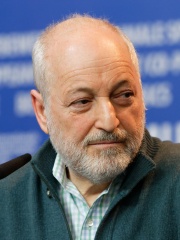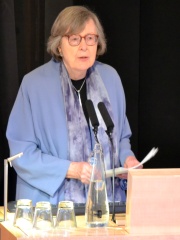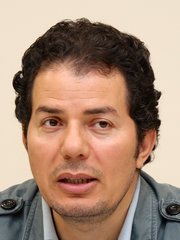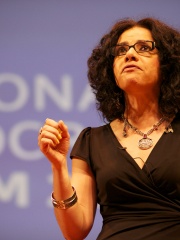

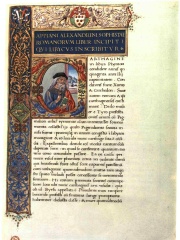
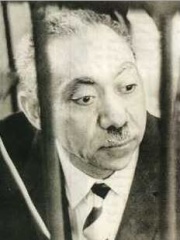

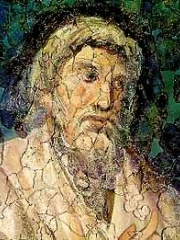
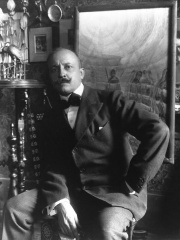
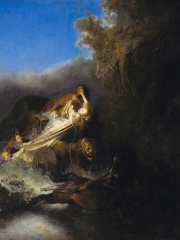
The Most Famous
WRITERS from Egypt
Top 10
The following people are considered by Pantheon to be the top 10 most legendary Egyptian Writers of all time. This list of famous Egyptian Writers is sorted by HPI (Historical Popularity Index), a metric that aggregates information on a biography's online popularity. Visit the rankings page to view the entire list of Egyptian Writers.

1. Naguib Mahfouz (1911 - 2006)
With an HPI of 80.63, Naguib Mahfouz is the most famous Egyptian Writer. His biography has been translated into 139 different languages on wikipedia.
Naguib Mahfouz Abdelaziz Ibrahim Ahmed Al-Basha (Arabic: نجيب محفوظ عبد العزيز ابراهيم احمد الباشا, IPA: [næˈɡiːb mɑħˈfuːzˤ]; 11 December 1911 – 30 August 2006) was an Egyptian writer who won the 1988 Nobel Prize in Literature. In awarding the prize, the Swedish Academy described him as a writer "who, through works rich in nuance – now clear-sightedly realistic, now evocatively ambiguous – has formed an Arabian narrative art that applies to all mankind". Mahfouz is regarded as one of the first contemporary writers in Arabic literature, along with Taha Hussein, to explore themes of existentialism. He is the only Egyptian to win the Nobel Prize in Literature. He published 35 novels, over 350 short stories, 26 screenplays, hundreds of op-ed columns for Egyptian newspapers, and seven plays over a 70-year career, from the 1930s until 2004. All of his novels are set in Egypt, and always mention the concept of "the lane" as a microcosm of the world. His most famous works include The Cairo Trilogy and Children of Gebelawi. Many of Mahfouz's works have been adapted into Egyptian and international films; Making him one of the most widely adapted Arab authors. While Mahfouz's literature is classified as realist literature, existential themes appear in it.

2. Apollonius of Rhodes (295 BC - 215 BC)
With an HPI of 75.13, Apollonius of Rhodes is the 2nd most famous Egyptian Writer. His biography has been translated into 52 different languages.
Apollonius of Rhodes (Ancient Greek: Ἀπολλώνιος Ῥόδιος Apollṓnios Rhódios; Latin: Apollonius Rhodius; fl. first half of 3rd century BC) was an ancient Greek author, best known for the Argonautica, an epic poem about Jason and the Argonauts and their quest for the Golden Fleece. The poem is one of the few extant examples of the epic genre and it was both innovative and influential, providing Ptolemaic Egypt with a "cultural mnemonic" or national "archive of images", and offering the Latin poets Virgil and Gaius Valerius Flaccus a model for their own epics. His other poems, which survive only in small fragments, concerned the beginnings or foundations of cities, such as Alexandria and Cnidus places of interest to the Ptolemies, whom he served as a scholar and librarian at the Library of Alexandria. A literary dispute with Callimachus, another Alexandrian librarian/poet, is a topic much discussed by modern scholars since it is thought to give some insight into their poetry, although there is very little evidence that there ever was such a dispute between the two men. In fact, almost nothing at all is known about Apollonius and even his connection with Rhodes is a matter for speculation. Once considered a mere imitator of Homer, and therefore a failure as a poet, his reputation has been enhanced by recent studies, with an emphasis on the special characteristics of Hellenistic poets as scholarly heirs of a long literary tradition writing at a unique time in history.

3. Appian (95 - 165)
With an HPI of 74.36, Appian is the 3rd most famous Egyptian Writer. His biography has been translated into 56 different languages.
Appian of Alexandria (; Ancient Greek: Ἀππιανὸς Ἀλεξανδρεύς, romanized: Appianòs Alexandreús; Latin: Appianus Alexandrinus; c. 95 – c. AD 165) was a Greek historian with Roman citizenship who prospered during the reigns of the Roman Emperors Trajan, Hadrian, and Antoninus Pius. He was born c. 95 in Alexandria. After holding the senior offices in the province of Aegyptus (Egypt), he went to Rome c. 120, where he practiced as an advocate, pleading cases before the emperors (probably as advocatus fisci, an important official of the imperial treasury). It was in 147 at the earliest that he was appointed to the office of procurator, probably in Egypt, on the recommendation of his friend Marcus Cornelius Fronto, an influential rhetorician and advocate. Because the position of procurator was open only to members of the equestrian order (the "knightly" class), his possession of this office tells us about Appian's family background. His principal surviving work (Ρωμαϊκά Romaiká, known in Latin as Historia Romana and in English as Roman History) was written in Greek in 24 books, before 165. This work more closely resembles a series of monographs than a connected history. It gives an account of various peoples and countries from the earliest times down to their incorporation into the Roman Empire, and survives in complete books and considerable fragments. The work is very valuable, especially for the period of the civil wars. The Civil Wars, books 13–17 of the Roman History, concern mainly the end of the Roman Republic and take a conflict-based view and approach to history. Despite the lack of cited sources for his works, these books of the Roman History are the only extant comprehensive description of these momentous decades of Roman history. The other extant work of Appian is his "The Foreign Wars", which includes an ethnographic style history recounting the various military conflicts against a foreign enemy in Roman history, until the time of Appian.

4. Sayyid Qutb (1906 - 1966)
With an HPI of 74.34, Sayyid Qutb is the 4th most famous Egyptian Writer. His biography has been translated into 49 different languages.
Sayyid Ibrahim Husayn Shadhili Qutb (9 October 1906 – 29 August 1966) was an Egyptian political theorist and revolutionary who was a leading member of the Muslim Brotherhood. As the author of 24 published books, with around 30 unpublished for different reasons (mainly destruction by the state), and at least 581 articles, including novels, literary arts critique and works on education, Qutb is best known in the Muslim world for his work on what he believed to be the social and political role of Islam, particularly in his books Social Justice and Ma'alim fi al-Tariq (Milestones). His magnum opus, Fi Zilal al-Qur'an (In the Shade of the Qur'an), is a 30-volume commentary on the Quran. Even though most of his observations and criticism were leveled at the Muslim world, Qutb also intensely disapproved of the society and culture of the United States, which he saw as materialistic, and obsessed with violence and sexual pleasures. He advocated violent, offensive jihad. During most of his life, Qutb's inner circle mainly consisted of influential politicians, intellectuals, poets and literary figures, both of his age and of the preceding generation. By the mid-1940s, many of his writings were included in the curricula of schools, colleges and universities. In 1966, he was convicted of plotting the assassination of Egyptian President Gamal Abdel Nasser and was executed by hanging. Qutb has been described by followers as a great thinker and martyr for Islam, while many Western observers (and some Muslims) see him as a key originator of Islamist ideology, and an inspiration for violent Islamist groups such as al-Qaeda. Qutb is widely regarded as one of the most leading Islamist ideologues of the twentieth century. Strengthened by his status as a martyr, Qutb's ideas on Jahiliyya (pre-Islamic Arabia) and his close linking of implementation of sharia (Islamic Law) with Tawhid (Islamic monotheism) has highly influenced contemporary Islamist and Jihadist movements. Today, his supporters are identified by their opponents as "Qutbists" or "Qutbi".
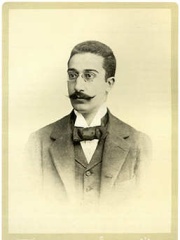
5. Constantine P. Cavafy (1863 - 1933)
With an HPI of 74.33, Constantine P. Cavafy is the 5th most famous Egyptian Writer. His biography has been translated into 56 different languages.
Konstantinos Petrou Kavafis (Greek: Κωνσταντίνος Πέτρου Καβάφης [ka'vafis]; 29 April (OS 17 April), 1863 – 29 April 1933), known, especially in English, as Constantine P. Cavafy and often published as C. P. Cavafy (), was a Greek poet, journalist, and civil servant from Alexandria. A major figure of modern Greek literature, he is sometimes considered the most distinguished Greek poet of the 20th century. His works and consciously individual style earned him a place among the most important contributors not only to Greek poetry, but to Western poetry as a whole. Cavafy's poetic canon consists of 154 poems, while dozens more that remained incomplete or in sketch form were not published until much later. He consistently refused to publish his work in books, preferring to share it through local newspapers and magazines, or even print it himself on broadsheets and give it away to anyone who might be interested. His most important poems were written after his fortieth birthday and published two years after his death. Cavafy's work has been translated numerous times into many languages. His friend E. M. Forster, the novelist and literary critic, first introduced his poems to the English-speaking world in 1923; he referred to him as "The Poet", famously describing him as "a Greek gentleman in a straw hat, standing absolutely motionless at a slight angle to the universe". His work, as one translator put it, "holds the historical and the erotic in a single embrace".

6. Athenaeus (200 - 223)
With an HPI of 73.38, Athenaeus is the 6th most famous Egyptian Writer. His biography has been translated into 48 different languages.
Athenaeus of Naucratis (; Ancient Greek: Ἀθήναιος ὁ Nαυκρατίτης or Nαυκράτιος, Athēnaios Naukratitēs or Naukratios; Latin: Athenaeus Naucratita) was an ancient Greek rhetorician and grammarian, flourishing about the end of the 2nd and beginning of the 3rd century AD. The Suda says only that he lived in the times of Marcus Aurelius, but the contempt with which he speaks of Commodus, who died in 192, implies that he survived that emperor. He was a contemporary of Adrantus. Athenaeus himself states that he was the author of a treatise on the thratta, a type of fish mentioned by Archippus and other comic poets, and of a history of the Syrian kings. Both works are lost. Of his works, only the fifteen-volume Deipnosophistae mostly survives.

7. Lactantius (250 - 325)
With an HPI of 73.15, Lactantius is the 7th most famous Egyptian Writer. His biography has been translated into 44 different languages.
Lucius Caecilius Firmianus Lactantius (c. 250 – c. 325) was an early Christian author who became an advisor to Roman emperor Constantine I, guiding his Christian religious policy in its initial stages of emergence, and a tutor to his son Crispus. His most important work is the Institutiones Divinae ("The Divine Institutes"), an apologetic treatise intended to establish the reasonableness and truth of Christianity to pagan critics. He is best known for his apologetic works, widely read during the Renaissance by humanists, who called Lactantius the "Christian Cicero". Also often attributed to Lactantius is the poem The Phoenix, which is based on the myth of the phoenix from Egypt and Arabia. Though the poem is not clearly Christian in its motifs, modern scholars have found some literary evidence in the text to suggest the author had a Christian interpretation of the eastern myth as a symbol of resurrection.

8. Filippo Tommaso Marinetti (1876 - 1944)
With an HPI of 72.96, Filippo Tommaso Marinetti is the 8th most famous Egyptian Writer. His biography has been translated into 51 different languages.
Filippo Tommaso Emilio Marinetti (Italian: [fiˈlippo tomˈmaːzo mariˈnetti]; 22 December 1876 – 2 December 1944) was an Italian poet, editor, art theorist and founder of the Futurist movement. He was associated with the utopian and Symbolist artistic and literary community Abbaye de Créteil between 1907 and 1908. Marinetti is best known as the author of the Manifesto of Futurism, which was written and published in 1909, and as a co-author of the Fascist Manifesto, in 1919.

9. Claudian (370 - 404)
With an HPI of 70.15, Claudian is the 9th most famous Egyptian Writer. His biography has been translated into 41 different languages.
Claudius Claudianus, known in English as Claudian (Greek: Κλαυδιανός; c. 370 – c. 404 AD), was a Latin poet associated with the court of the Roman emperor Honorius at Mediolanum (Milan), and particularly with the general Stilicho. His work, written almost entirely in hexameters or elegiac couplets, falls into three main categories: poems for Honorius, poems for Stilicho, and mythological epic.

10. Nonnus (500 - 500)
With an HPI of 69.60, Nonnus is the 10th most famous Egyptian Writer. His biography has been translated into 35 different languages.
Nonnus of Panopolis (Ancient Greek: Νόννος ὁ Πανοπολίτης, Nónnos ho Panopolítēs, fl. 5th century AD) was the most notable Greek epic poet of the Imperial Roman era. He was a native of Panopolis (Akhmim) in the Egyptian Thebaid and probably lived in the 5th century AD. He is known as the composer of the Dionysiaca, an epic tale of the god Dionysus, and of the Metabole, a paraphrase of the Gospel of John. The epic Dionysiaca describes the life of Dionysus, his expedition to India, and his triumphant return. It was written in Homeric Greek and in dactylic hexameter, and it consists of 48 books at 20,426 lines.
People
Pantheon has 63 people classified as Egyptian writers born between 300 BC and 1972. Of these 63, 9 (14.29%) of them are still alive today. The most famous living Egyptian writers include Alaa Al Aswany, André Aciman, and Bat Ye'or. The most famous deceased Egyptian writers include Naguib Mahfouz, Apollonius of Rhodes, and Appian. As of April 2024, 1 new Egyptian writers have been added to Pantheon including Hamed Abdel-Samad.
Living Egyptian Writers
Go to all RankingsAlaa Al Aswany
1957 - Present
HPI: 58.81
André Aciman
1951 - Present
HPI: 58.60
Bat Ye'or
1933 - Present
HPI: 57.97
Magdi Allam
1952 - Present
HPI: 55.73
Penelope Lively
1933 - Present
HPI: 53.53
Karim Rashid
1960 - Present
HPI: 53.11
Leila Aboulela
1964 - Present
HPI: 49.12
Hamed Abdel-Samad
1972 - Present
HPI: 46.98
Mona Eltahawy
1967 - Present
HPI: 46.41
Deceased Egyptian Writers
Go to all RankingsNaguib Mahfouz
1911 - 2006
HPI: 80.63
Apollonius of Rhodes
295 BC - 215 BC
HPI: 75.13
Appian
95 - 165
HPI: 74.36
Sayyid Qutb
1906 - 1966
HPI: 74.34
Constantine P. Cavafy
1863 - 1933
HPI: 74.33
Athenaeus
200 - 223
HPI: 73.38
Lactantius
250 - 325
HPI: 73.15
Filippo Tommaso Marinetti
1876 - 1944
HPI: 72.96
Claudian
370 - 404
HPI: 70.15
Nonnus
500 - 500
HPI: 69.60
Dionysius Thrax
170 BC - 89 BC
HPI: 69.60
Pope Dionysius of Alexandria
190 - 264
HPI: 69.10
Newly Added Egyptian Writers (2025)
Go to all RankingsOverlapping Lives
Which Writers were alive at the same time? This visualization shows the lifespans of the 25 most globally memorable Writers since 1700.


